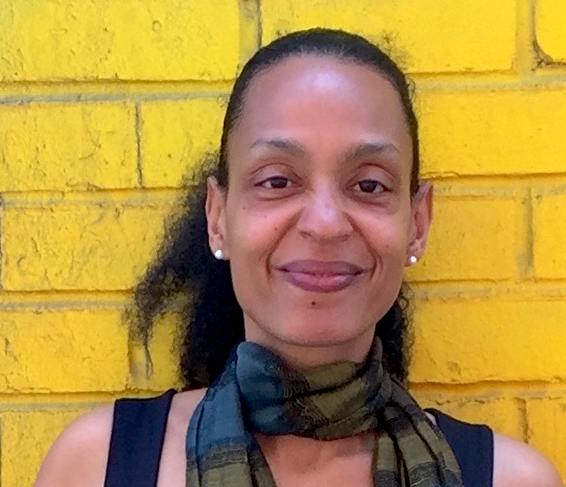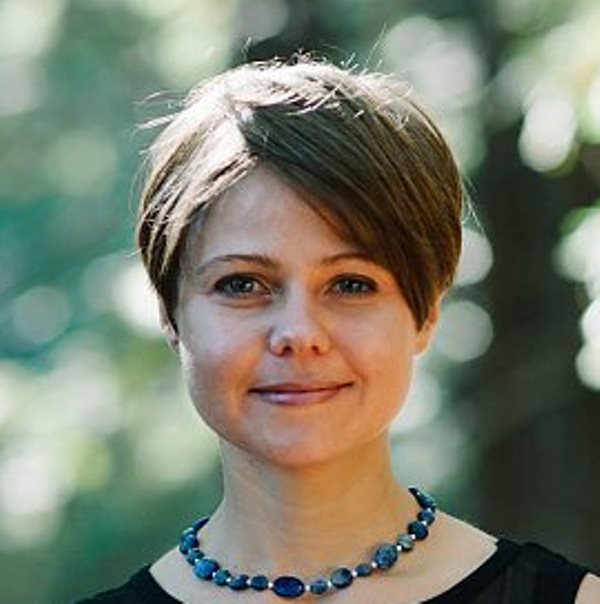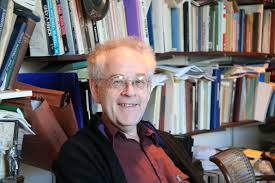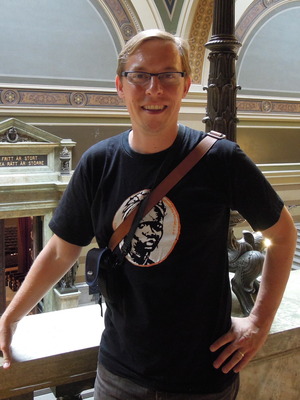
Congratulations to PhD alumna Dr. Marceline Saibou, who has been appointed as Assistant Professor of Music at Bowdoin College!
Dr. Saibou's 2016 PhD dissertation was entitled "Presence, Absence, and Disjunctures: Popular Music and Politics in Lomé, Togo, 1967-2005.” The dissertation was sponsored by Prof. Aaron Fox, and her committee included Alessandra Ciucci and George Lewis (Music, Columbia), and distinguished Columbia ethnomusicology alumni Ryan Skinner (Music and African Studies, OSU) and Andrew Eisenberg (Music, NYU Abu Dhabi).
 The Center for Ethnomusicology congratulates PhD alumna Dr. Shannon Garland,who has been appointed as a Postdoctoral Fellow in Ethnomusicology at UCLA for the academic year 2017-2018.
The Center for Ethnomusicology congratulates PhD alumna Dr. Shannon Garland,who has been appointed as a Postdoctoral Fellow in Ethnomusicology at UCLA for the academic year 2017-2018.
Dr. Garland has also been awarded a postdoctoral research fellowship from the State of São Paulo Research Support Foundation (Fundação de Amparo à Pesquisa do Estado de São Paulo—FAPESP) in Brazil to conduct the research project A New National? The Construction of a National Independent Music through Festivals in São Paulo (Um Novo Nacional?: A Construção de Música Nacional Independente por Festivais em São Paulo), as part of a 5-year, multi-party and multi-sited research grant called Local Musicking: New Pathways for Ethnomusicology (O Musicar Local--Novas Trilhas para a Etnomusicologia). The project is led by Ana Suzel Reily, Arts Institute, University of Campinas; Rose Hijiki, Department of Anthropology and the Sound and Image Laboratory, University of São Paulo; and Flávia Toni, Institute for Brazilian Studies and Department of Music, University of São Paulo.
Dr. Garland will be joining UCLA this fall, after which she will continue in 2018-19 to take up her appointment in Brazil.
Dr. Garland's 2014 PhD dissertation in ethnomusicology at Columbia was entitled "Music, Affect, Value, and Labor: Late
Capitalism and the (Mis)Productions of Indie Music
in Chile and Brazil" and was advised by Prof. Ana Maria Ochoa.
Event Start:
Thursday, April 13, 2017 - 7:00pm - 9:00pm
Location:
Book Culture 536 W 112th St New York, NY 10025
Please join us on April 13 at 7:00 p.m. for a discussion of the book “The Great Woman Singer: Gender and Voice in Puerto Rican Music” by professor Licia Fiol-Matta. This talk is co-sponsored by The Center for Ethnomusicology at Columbia University and Book Culture. It is moderated by professor Ana Maria Ochoa from the Department of Music at Columbia University. Panelists include: Licia Fiol-Matta, Jack Halberstam and Alexandra Vazquez.

Licia Fiol-Matta is Visiting Professor of Spanish and Portuguese at New York University. She received an AB from Princeton University and a PhD from Yale University, both in Comparative Literature. She is the author of A Queer Mother for the Nation: The State and Gabriela Mistral (Minnesota) and The Great Woman Singer: Gender and Voice in Puerto Rican Music (Duke). Fiol-Matta is co-editor of the series New Directions in Latino American Cultures (Palgrave) and The Puerto Rico Reader: History, Culture, Politics (under contract, Duke).
Ana Maria Ochoa is professor in the Department of Music and the Center for the Study of Ethnicity and Race at Columbia University. Her latest book Aurality, Listening and Knowledge in Nineteenth-Century Colombia (2014) is co-recipient of the Alan Merriam Prize in Ethnomusicology. She is currently working on the relationship between music, sound and the anthropocene, indigenous understandings of music and the relation to multinaturalism, and the relationship of silence, noise and music to the construction of postconflict. She has been a recipient of the Guggenheim Fellowship, the Alan Merriam Award in Ethnomusicology, and the Greenleaf Distinguished Scholar Fellowship, among others.
Jack Halberstam is Visiting Professor of Gender Studies and English at Columbia University. Halberstam is the author of five books including: Skin Shows: Gothic Horror and the Technology of Monsters (Duke UP, 1995), Female Masculinity (Duke UP, 1998), In A Queer Time and Place (NYU Press, 2005), The Queer Art of Failure (Duke UP, 2011) and Gaga Feminism: Sex, Gender, and the End of Normal (Beacon Press, 2012). Halberstam is currently working on several projects including a book titled WILD THING on queer anarchy and a short book titled Trans* for UC Press, forthcoming in 2017.
Alexandra T. Vazquez is Associate Professor of Performance Studies at New York University. She is the author of Listening in Detail: Performances of Cuban Music (Duke University Press 2013). Her work has been featured in the journals Small Axe, American Quarterly, Social Text, women and performance, and the Journal of Popular Music Studies; and in the edited volumes Nonstop Metropolis: A New York City Atlas, Reggaeton, and Pop When the World Falls Apart. Vazquez is currently working on Writing Sound: The Florida Project, which investigates Florida as an under-theorized yet vibrant creative laboratory of the circum-Atlantic world.
Event Start:
Tuesday, March 28, 2017 - 5:00pm - 7:00pm
Location:
701C Dodge Hall (The Center for Ethnomusicology)
Taking off from the 2016 article in “Ethnomusicology” on my work in Detroit music history, the talk will survey the topics and approach of the completed book manuscript, which blends personal and family accounts, oral history from interviewees, and archival sources to illuminate the musical life of America’s fourth-largest city, called “the capital of the twentieth century,” even as capitalism and racism were sowing the seeds of Detroit’s decline.

Mark Slobin is the Winslow-Kaplan Professor of Music Emeritus at Wesleyan University and the author or editor of many books, on Afghanistan and Central Asia, eastern European Jewish music, film music, and ethnomusicology theory, two of which have received the ASCAP-Deems Taylor Award: "Fiddler on the Move: Exploring the Klezmer World" and "Tenement Songs: Popular Music of the Jewish Immigrants. His current project is on the musical life of Detroit, 1940s-60s. He has been President of the Society for Ethnomusicology and the Society for Asian Music.
Event Start:
Tuesday, March 21, 2017 - 2:10pm - 4:00pm
Location:
701C Dodge Hall (The Center for Ethnomusicology)
The Center for Ethnomusicology presents:
A Discussion of the work of ethnomusicologist
Jane Sugarman
March 21, 2:10PM - 4:00PM701C Dodge Hall (Center for Ethnomusicology)
Free and open to the public
Jane C. Sugarman is Professor of Music at the Graduate Center of the City University of New York, where she directs the program in ethnomusicology. She is the author of Engendering Song: Singing and Subjectivity at Prespa Albanian Weddings (Univ. of Chicago Press, 1997), as well as numerous articles on music and dance in and from southeastern Europe as they relate to gender and sexuality, nation, diaspora, and conflict zones. Her current book project examines a half-century of mediated Albanian musics from the former Yugoslavia and their role in imagining "modern" Albanian identities.
Event Start:
Saturday, March 11, 2017 - 5:00pm
Location:
Casa Hispanica (612 West 116th Street New York , NY 10027)
The Center for the Study of Ethnicity and Race and the Transnational Asian | American Series at Columbia University
Present a Screening of
LIGHT
(2017), 57 minutes
by Lenora Lee and Tatsu Aoki
TUESDAY, APRIL 11 at 5pm
Casa Hispánica (612 West 116th Street New York , NY 10027)
Free and Open to the Public
Further information at:
FOLLOWED BY TALKBACK WITH:
filmmaker/musician TATSU AOKI
choreographer/dancer LENORA LEE
and composer/saxophonist FRANCIS WONG
Discussants:
David H. Hwang, Associate Professor of Theater Arts, Columbia University and
Karen Shimakawa, Associate Professor Performance studies, New York University
Co-sponsored by the Center for Ethnomusicology, inter alia
Event Start:
Wednesday, February 22, 2017 - 7:01pm - 9:01pm
Location:
Book Culture 536 W 112th St New York, NY 10025
Please join us Wednesday, February 22nd at 7pm for a discussion
of the Punk Ethnography, edited
by Michael Veal and E. Tammy Kim. This
talk is co-sponsored by The Center for Ethnomusicology at
Columbia University and Book Culture. It is moderated by Alessandra Ciucci from the Department of Music at Columbia University.Panelists include: Michael Veal, E. Tammy Kim, Will Glasspiegel, Rachel Lears,
and Stanley Scott. .
A critical companion to the radical DIY record
label that challenges the conventions of ethnography, representation, and the
category of “world music.”
This ground-breaking case
study examines record production as ethnographic work. Since its founding in
2003, Seattle-based record label Sublime Frequencies has produced world music
recordings that have been received as radical, sometimes problematic critiques
of the practices of sound ethnography. Founded by punk rocker brothers Alan and
Richard Bishop, along with filmmaker Hisham Mayet, the label's releases
encompass collagist sound travelogues; individual artist compilations;
national, regional and genre surveys; and DVDs all designed in a distinctive
graphic style recalling the DIY aesthetic of punk and indie rock. Sublime
Frequencies producers position themselves as heirs to canonical ethnographic
labels such as Folkways, Nonesuch, and Musique du Monde, but their aesthetic
and philosophical roots in punk, indie rock, and experimental music effectively
distinguish their work from more conventional ethnographic norms. Situated at
the intersection of ethnomusicology, sound studies, cultural anthropology, and
popular music studies, the essays in this volume explore the issues surrounding
the label including appropriation and intellectual property while providing
critical commentary and charting the impact of the label through listener
interviews.
Alessandra
Ciucci is Assistant
Professor of Music (Ethnomusicology) at Columbia University. Her research
interests include the music of North Africa, particular Morocco, music and
gender, sung poetry, and music and migration. She is currently working on a
monograph on music and the Moroccan migration to Italy.

Michael E. Veal is a musician and professor of ethnomusicology at Yale University. He is the author of several books,
including Fela: The Life and Times of an African Musical
Icon and Dub: Soundscapes and Shattered
Songs in Jamaican Reggae.
E. Tammy Kim is a writer and member of The New Yorker's editorial staff. She previously worked
as a staff writer at Al Jazeera America and
as a social justice lawyer.
Wills Glasspiegel is
a multimedia journalist and artist with a background in music management. His
work has appeared on NPR, Fader, Vice, Dis Magazine and Afropop
Worldwide, As a manager, Glasspiegel facilitated the introduction of two
niche electronic music genres: Shangaan electro from South
Africa and bubu from Sierra Leone. He is currently a Ph.D
candidate at Yale in African-American Studies/American Studies where his work
is focused around footwork, a music and dance style from Chicago, Glasspiegel's
hometown.
Rachel Lears is
a filmmaker, writer, and musician based in Brooklyn, New York. Her first
documentary Birds of Passage (2010) explored the everyday
struggles of two Uruguayan songwriters. Her most recent documentary
project The Hand That Feeds follows an historic labor campaign
led by undocumented immigrant workers in New York City, and is supported by the
Sundance Documentary Program. She holds a Ph.D in Cultural Anthropology from
New York University, and her doctoral research on media and cultural policy in
Uruguay was supported by grants from Fulbright-Hays and the American Council of
Learned Societies/Mellon Foundation. Her ongoing video art collaborations with
artist Saya Woolfolk have screened in numerous galleries and museums worldwide.
Stanley Scott
teaches Indian music at Yale and Wesleyan Universities and directs the Rangila
School of Music, serving Connecticut's South Asian community. He received the
2011 Mumbai Music Award for "contribution to the cause of Indian music by
an overseas-resident personality," and the 2001 lifetime achievement award
from New York's Cultural Association of Bengal. His recordings
include The Weaver's Song: Bhajans of North India and a major
role in Anthony Braxton's opera Trillium E. He has performed as a featured
artist at Kolkatta's Rabindra Sadhan, Mumbai's NCPA and Bharatiya Vidya Bhavan,
Delhi University, and New York's Chhandayan Institute.
Event Start:
Thursday, February 2, 2017 - 12:00pm
Location:
701C Dodge Hall (The Center for Ethnomusioclogy)
The Center for Ethnomusicology presents a talk by:
Prof. Alexander Weheliye
(Professor, Department of African American Studies, Northwestern University)
Black Life -- Schwarz-Sein
Thursday, Feb. 2, 2017
12:00PM-2:00PM
701C Dodge Hall (The Center for Ethnomusicology)
Columbia Morningside Campus, Broadway and 116th St.
This talk pays particular attention to the complex ways gender and sexuality function in the barring of Black flesh from the category of the human-as-Man by investigating inhabitations of the flesh that bring to light the relational being-in-the-world of Black Life. That is, examples from literature and music that render the constitutive ungendered displacement of Black Life from origin and belonging habitable by staging the affectability of Black mattering as second sight.
Alexander Weheliye is a scholar and teacher of black literature and culture, critical theory, social technologies, and popular culture. He is a Professor in the department of African American Studies at Northwestern University. Weheliye is the author of Phonographies: Grooves in Sonic Afro-Modernity (Duke University Press, 2005), which was awarded The Modern Language Association's William Sanders Scarborough Prize for Outstanding Scholarly Study of Black American Literature or Culture and Habeas Viscus: Racializing Assemblages, Biopolitics, and Black Feminist Theories of the Human (Duke University Press, 2014). Currently, he is working on two projects. The first, Black Life/Schwarz-Sein, establishes Blackness as an ontology of ungendering.The second, Feenin: R&B’s Technologies of Humanity, offers a critical history of the intimate relationship between R&B music and technology since the late 1970s.
Event Start:
Saturday, March 4, 2017 - 9:00am - 6:00pm
CMSC 2017 Call for Papers
Music: Order and Disorder
Saturday, March 4, 2017
Columbia Music Scholarship Conference is the Department of Music's annual, graduate-student-run conference.
The theme of our 2017 conference, to be held on Saturday March 4, is "Music: Order and Disorder."
Event Start:
Tuesday, January 24, 2017 - 5:00pm - 7:00pm
Location:
701C Dodge Hall (The Center for Ethnomusioclogy)
The Center for Ethnomusicology presents a talk by:
Prof. Ryan Skinner
(Associate Professor, School of Music and Department of African and African-American Studies, The Ohio State University)
"Walking, Talking, Re-membering: An Afro-Swedish Critique of Being-in-the-world."
Tuesday, January 24, 2 017
5:00-7:00PM
701C Dodge Hall (The Center for Ethnomusicology)
Columbia University Morningside Campus (Broadway and 116th St.)
In this lecture, Ryan Skinner will examine the existential grounds and limits of an embodied and intersubjective being-in-the-world, in walking dialogue with the remembrances of Afro-Swedish subjects. To walk, wander, and roam in Sweden, particularly through the abundant green spaces that intrude upon and surround nearly every town and city, is a biopolitical act. It is a sign of personal vitality, healthfulness, and a kind of being-with others predicated on a regular, self-conscious, and often solitary being-toward nature. Yet, for many non-white Africa-descended Swedes, such an imagined community of salubrious and, for the most part, anonymous walkers is largely just that, a socially constructed fiction that perforce (which is to say "by force") excludes them; an abstraction of urban planning that encumbers their movements, creating anomalous spaces of stasis and immobility; a caesura in the biopolitical field that indexes their black lives as matter out of place, beyond both culture and nature. If the phenomenological axiom of being-in-the-world posits a dialogic and corporeal co-presence of mutually constitutive subjectivities, then the perambulatory culture of Afro-Swedes suggests a state of exception—a breach in the intersubjective field—one which Afro-Swedish subjects critically address through doubly conscious re-membering, recollecting the histories of violence that set them apart, and distinguish their struggle.

Ryan Skinner is Associate Professor of ethnomusicology in the School of Music and the Department of African American and African Studies at The Ohio State University. Dr. Skinner’s research focuses on popular culture, ethics, cultural politics, public piety, intellectual property, and new social movements and modes of identification in Africa and its diasporas. He is the author of Bamako Sounds: The Afropolitan Ethics of Malian Music (University of Minnesota Press, 2015), and a children’s book, Sidikiba’s Kora Lesson (Beaver’s Pond Press, 2008). He is also an accomplished kora (21-stringed West African harp) player.